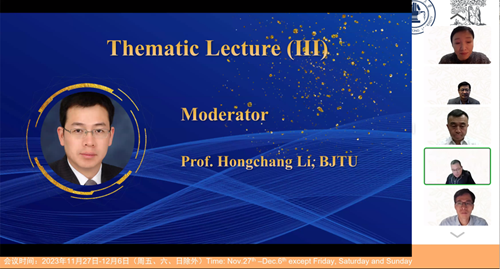The TSTE2023 Transport Economics Editor-in-Chief Meeting: Special Lecture Series (Part 3) on "Case Studies on Transport Policy" Successfully Held.
On November 29, 2023, from 20:00 to 22:00 Beijing time, a special lecture titled "Air Travel Choice, Online Meeting and Passenger Heterogeneity - What shall be done for the aviation industry?" was delivered by Professor Xiaowen Fu, Editor-in-Chief of the journal Case Studies on Transport Policy and Head of the Department of Industrial and Systems Engineering at the Hong Kong Polytechnic University. This lecture was part of the third session in the "Transport Economics Editor-in-Chief Face-to-Face Meeting" series, held during the 11th "Transportation and Spatio-Economic Forum" International Conference. The event, co-hosted by the School of Economics and Management of Beijing Jiaotong University and Elsevier Group, was broadcast live globally through ZOOM online meetings, Elsevier video channels, and service accounts. The session was chaired by Professor Li Hongchang from the School of Economics and Management, Beijing Jiaotong University. The meeting attracted 4630 online participants, with 60 attendees in the ZOOM meeting room and 4570 views on Elsevier platforms.

Professor Xiaowen Fu, who is also the Director of Engineering Management in the Department of Industrial and Systems Engineering at the Hong Kong Polytechnic University, specializes in transportation economics and management. His research encompasses competition policy and government regulation, international aviation liberalization, efficiency benchmarks, transportation demand models, and industrial organization. He has served as the principal investigator for over 20 research grants, guest editor for seven journal special issues, and author of over 100 journal articles. He is the Editor-in-Chief of Case Studies on Transport Policy and Deputy Editor of the Advances in Airlines Economics series. Professor Fu has provided consultancy and economic modeling services to various organizations, including Boeing Commercial Airplanes, the New Zealand Commerce Commission, the Australian Competition and Consumer Commission, the Australian Competition Tribunal, the Hong Kong Civil Aviation Department, the Hong Kong Transport and Housing Bureau, Japan Railway (East), and the OECD. He holds positions such as Director of the Research Centre for Behavioral and Knowledge Engineering, Vice President (Research) of the Air Transport Research Society (ATRS), Vice President (Research) of the Royal Aeronautical Society, Founding Chair of the Marine Economy and Policy session at the World Transport Convention, and a member of the technical and statistical task force for the UNCTAD Production Capacity Index. He is also an Honorary Professor at the University of Sydney Business School.

In his lecture, Professor Fu shared his latest research on the topic "Air Travel Choice, Online Meeting and Passenger Heterogeneity - What shall be done for the aviation industry?". He initially presented data on the impact of COVID-19 and travel control measures during the pandemic on air travel demand, noting the emerging trends in travel needs and preferences with the implementation of health control measures and the widespread use of online meetings. He then introduced his research on business travel behavior during the pandemic, using stated preference survey data from travelers in Hong Kong and applying a latent class panel model to analyze the influence of airport health control measures and online meetings on air travel choice behavior. The main findings indicated that the applicability of online meetings significantly influences air travelers' choice of behavior and can alter some travelers' attitudes towards airport health control measures. This, in turn, affects their willingness to pay (WTP) for additional travel time due to health control measures. Further expanding his analysis using online survey data from business travelers in Hong Kong, Shanghai, and the USA, Professor Fu explored regional heterogeneity in the impact of airport health control measures and online meetings on air travel choices. The research confirmed significant differences in attitudes towards providing personal information, travel history, and other health control measures among air travelers from different countries and regions, as well as noticeable heterogeneity in their WTP for additional travel time caused by these measures. This study offers important guidance for the design of travel health control policies in the aviation sector and decision-making support for governments in handling future public health emergencies.
During the lecture, Professor Fu focused on the impact of airport health control measures and online meetings on the business travel choices of air travelers during the pandemic, based on stated preference surveys from Hong Kong, Shanghai, and the USA. He also calculated air travelers' WTP for additional travel time due to health control measures, providing theoretical support for the design of travel health control measures. The lecture was highly beneficial for the attendees. Two invited reviewers, Professors Yang Hangjun and Yan Jia, summarized the content and contributions of this cutting-edge research and raised valuable questions, offering additional perspectives and dimensions for consideration. There was also an extensive Q&A session, allowing for fruitful exchanges between the guests and participants. This rigorous research, precise peer reviews, and multidimensional interaction provided an excellent learning and mutual benefit opportunity for all attendees.








